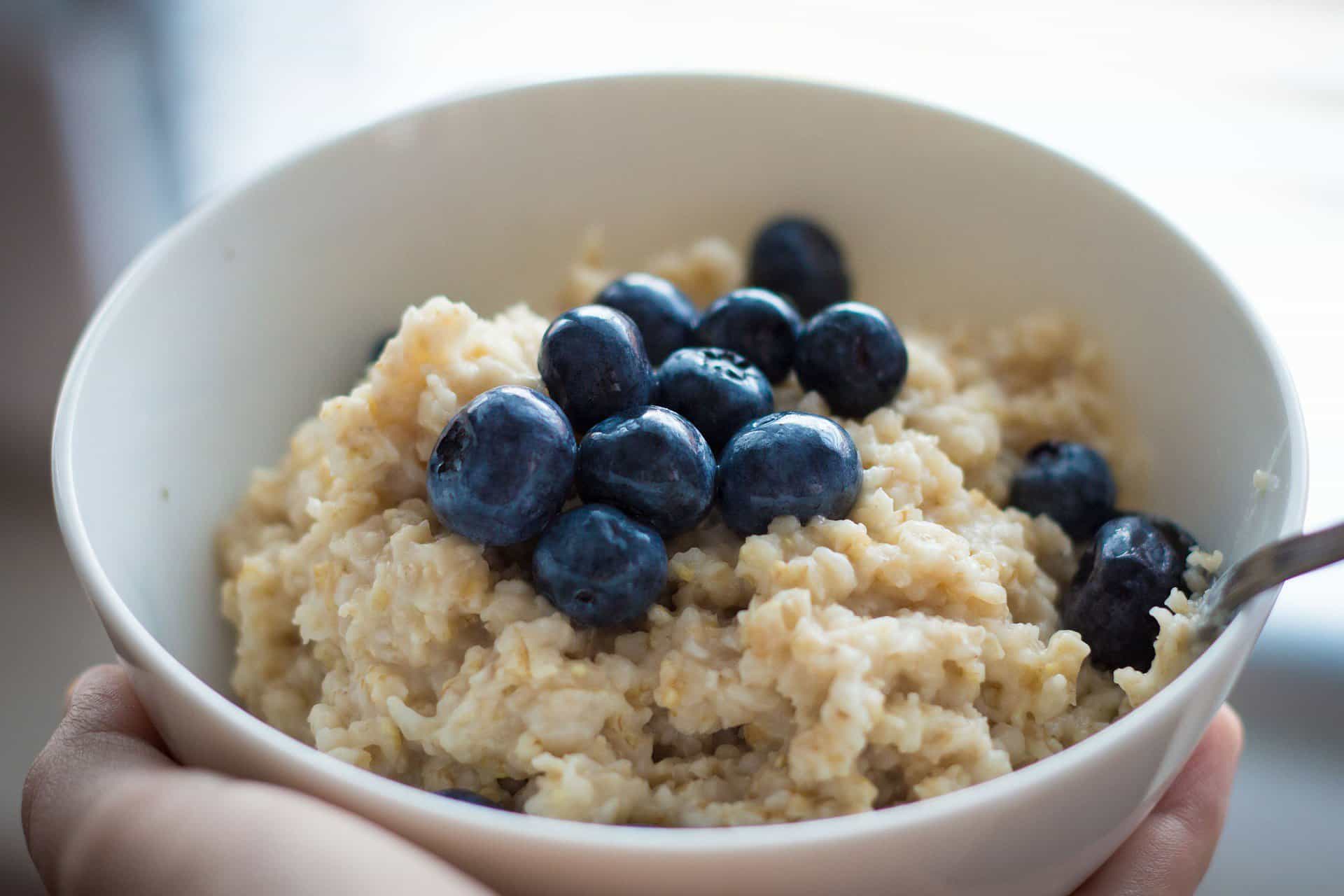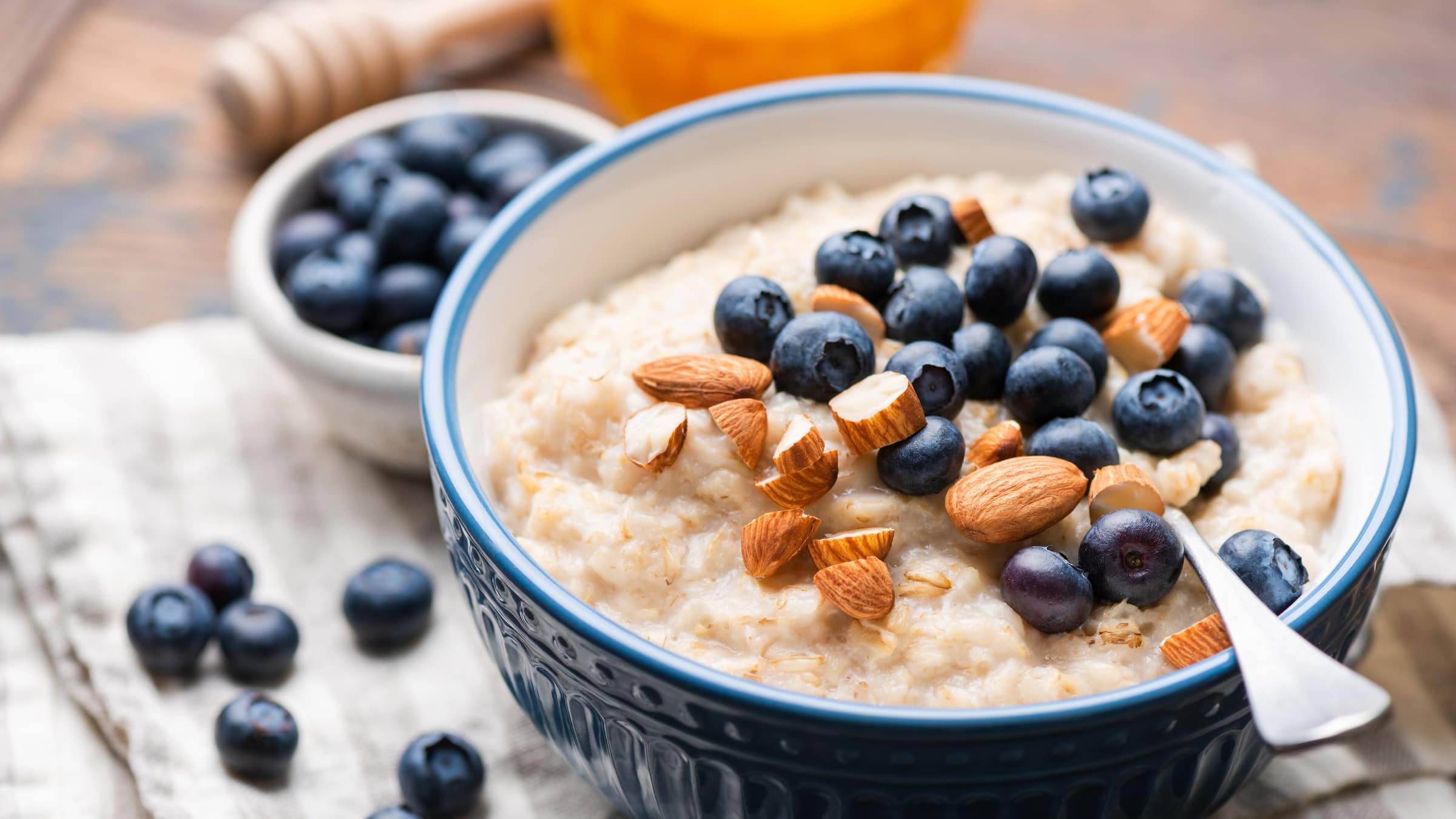Oatmeal Diet for Weight Loss
It’s not uncommon to see oatmeal listed as a healthy breakfast option that helps with weight loss. Oatmeal is a long standing fan favorite known for being a whole grain that’s high in fiber, easy to prepare, versatile and delicious!
But what you might not have realized is that there’s actually an entire weight loss diet centered around eating oatmeal daily. We already know that oatmeal can be a healthy addition to any diet, but is it really possible to lose weight and keep it off for good following a full oatmeal diet?
Let’s take a closer look at exactly what the oatmeal diet entails, the benefits of eating oatmeal for long-term weight loss, and find out whether the oatmeal diet is just another fad diet or if it could actually be a worthwhile approach to long-term weight loss.

What is the Oatmeal Diet?
- Phase 1: You eat mostly oatmeal for each meal of the day. This typically lasts one week.
- Phase 2: You still eat about ½ c of oatmeal for each meal, but add in fresh fruits & veggies with meals or as snacks.
- Phase 3: You shift back to a calorie-restricted, nutrient-dense diet that includes oatmeal occasionally rather than for every meal.
Why is oatmeal good for you?
Made from hulled oat grains that have either been rolled, ground, or steel-cut, oatmeal is a flour that is used in a variety of culinary forms. Oatmeal is good for you for a multitude of different reasons. Not only is eating oatmeal linked with health benefits such as weight loss and improved blood pressure, but regular consumption of oatmeal is also associated with an increased nutrient intake and a higher quality diet overall in both children and adults.
Now if you’re following an extreme oatmeal diet and eating oatmeal and oatmeal only for every meal, it could prove tough to squeeze in all of the nutrients you need and a wide variety of food groups. On the other hand, if you’re incorporating oatmeal and other oat-based products as a regular part of your meal routine, it’s easy to imagine how you could pair oatmeal with tons of other healthy, filling, nutrient-dense green foods!
Meal Planning with Oatmeal
For example, here’s a sample 3-day oatmeal for weight loss meal plan for a 1500 calorie per day diet that is heavy in oatmeal, but not completely restricted to oatmeal for all, or multiple, meals each day. After looking over the sample plan below, maybe you’re wondering how to come up with your own personalized diet plan. If so, check out these tips 9 meal prep tips! And if you want to limit your plan to plant-based foods only, start here to build a 7-day vegetarian meal plan.

Oatmeal Diet Recipes
It’s easy to think of an oatmeal diet as being bland, boring, and as getting old real quick. Because of that, it’s tempting to lean on sugar when trying to spice up a bowl of oatmeal. But by throwing in just a few extra ingredients (think fresh fruit, dried fruit, or even vegetables!), and leaving the sugar out instead, you can have a brand new and nutritious oatmeal experience every time.

Breakfast Oatmeal Recipes
When it comes to breakfast, most of us probably tend to gravitate towards oatmeal in its traditional form. But even with traditional porridge, the possibilities are endless!
- ½ c oatmeal + 1 tbsp peanut butter + 1 small apple + cinnamon
- ½ c oatmeal + 1 tbsp yogurt + ½ cup frozen blueberries + a drizzle of honey
- ½ c oatmeal + 1 tbsp chopped almonds or almond butter + ½ cup sliced banana + dash of vanilla
- ½ c oatmeal + 1 poached egg + ½ c kale + paprika
- ½ c oatmeal + 1 tbsp chopped cashews + ½ c sauteed veggies + curry powder
Lunch and Dinner Oatmeal Recipes
You might be looking at some of the healthy oatmeal recipes here and thinking “Oatmeal in soup? Say what?” But trust me on this one, oatmeal is not limited to breakfast alone. Give one of these savory risotto recipes a shot and I’ve got a feeling that is all you’ll need to change your mind on this one.
- Steel Cut Oat Risotto with Butternut Squash and Kale
- Spring Risotto Oats
- Moroccan Steel Cut Oats Soup
- Irish Oatmeal Leek Soup
Snack Oatmeal Recipes
Although it easily can be, oatmeal doesn’t have to be a full meal. It can also make for a quick, healthy, and no-fuss on-the-go snack option! And just like with breakfast, the great thing about oatmeal-based snacks is that once you’ve got a base recipe, it’s so easy to swap out a few ingredients and breathe new life into that recipe each time you prepare it. Here are a couple of ideas to get you started.
Health Benefits of Oatmeal
Aside from contributing to a higher quality diet, oatmeal (combined with other whole grains) is also known for helping to reduce cholesterol levels, blood pressure levels, and the risk of heart disease overall. But it still doesn’t stop there. Many of the health benefits of oatmeal are a result of the cereal’s high fiber content.
Real results with a personalized weight loss program
Take the quiz!


Here’s a quick overview of how oatmeal stacks up nutritionally:
How many calories are in oatmeal?
- 1 cup of oatmeal, cooked (prepared with water) contains about 159 calories.
- 1 cup of dry oatmeal contains about 341 calories.
How many carbs are in oatmeal?
- 1 cup of cooked oatmeal contains about 27 grams of carbohydrates.
- 1 cup of dry oatmeal contains about 58 grams of carbohydrates.
How much protein is in oatmeal?
- 1 cup of cooked oatmeal contains about 5 ½ grams of protein.
- 1 cup of dry oatmeal contains about 12 grams of protein.
How much fiber is in oatmeal?
- 1 cup of cooked oatmeal contains about 4 grams of fiber
- 1 cup of dry oatmeal contains about 8 ½ grams of fiber.
What other nutrients are in oatmeal?
Oatmeal is a great source of vitamins and minerals including:
- Iron
- Calcium
- Phosphorus
- Niacin
- Folate
- Vitamin A

Oatmeal & Weight Loss
Oatmeal contains both soluble fiber (like beta glucan) and insoluble (non-dissolvable) fibers. These fibers aid in digestive health and they also assist in stabilizing blood sugar levels – a tremendous benefit for people with diabetes or anyone else trying to control blood sugar while eating a moderate calorie diet. For weight loss, an oatmeal diet can contribute to a reduced calorie intake due to its high fiber content. The fiber in oats combined with the water in prepared oatmeal both help to keep you feeling full and satiated for longer, which in turn leads to a reduced calorie intake throughout the day.
While including oatmeal in your diet regularly can help you lose weight, you might still be wondering if the oatmeal diet is best for you or not. If you decide to give the oatmeal diet a a try, here are the benefits and risks you will want to keep in mind:
The Oatmeal Diet Plan: Pros & Cons
The benefits of an oatmeal diet are that it’s a relatively simple and structured way to limit your calorie count throughout the day and still feel full from the fiber and the water in the oatmeal. This is a big plus for weight loss. In addition, oatmeal itself has so many other health benefits like contributing to a healthy digestive system and helping to regulate blood pressure levels. Lastly, oatmeal is a quick, inexpensive, and relatively easy meal to prepare.
The risks of an oatmeal diet are that there’s a really good chance that you’ll already be feeling pretty tired of eating oatmeal by the time you hit the end of phase 1. The oatmeal diet doesn’t offer much variety in the types of meals you are allowed to consume, and if we’re being honest, it doesn’t really prepare you for learning how to consume a healthy diet on a daily basis once you’ve completed all three phases of the plan. Because the oatmeal diet offers so little variety, chances are that you might be missing out on some of the key nutrients found in other food groups.


Your Weight Loss Plan with Noom
This is where a more sustainable approach to weight loss, such as the Noom app can be helpful. At Noom, you’ll still be encouraged to eat a variety of foods that are high in water on your weight loss journey. But you’ll never be encouraged to eat just one type of those foods – whether it’s instant oatmeal, egg whites, or green tea. Fad diets might help you lose weight in the short run, but they’re just not sustainable.
Instead, Noom recommends choosing a variety of foods that are high in nutrient-density and low in calorie density to lose weight. Plus, Noom will provide you with a custom weight loss plan and a multitude of tools that you can use to help stay on track. And the best part is, you can access those tools directly on your phone 24 hours a day, 7 days a week.



